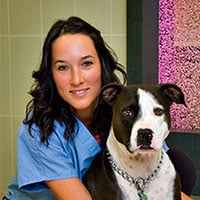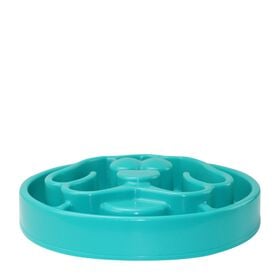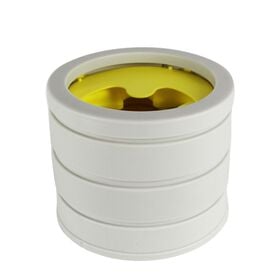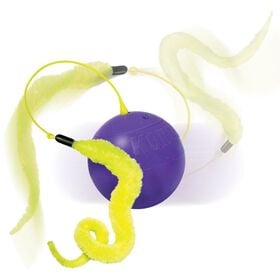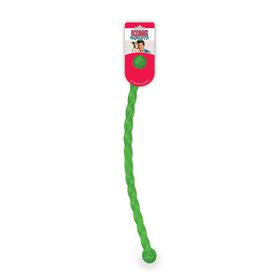For most pet owners, keeping their little babies healthy and svelte is one of their main priorities. Ideally, all pets should be at a healthy weight. But what’s important to remember is that, much like us, every pet has their own specific needs. Their age, the stage of life they’re in, their level of activity, and the environment in which they live all influence how many calories your pet will need to consume.
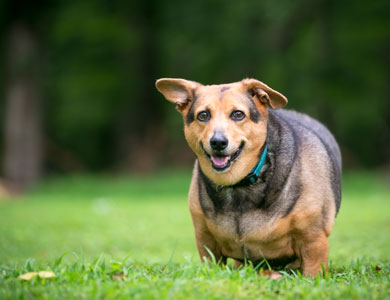
Dealing with an overweight pet
Have you noticed that your pet isn’t eating as much? Perhaps they’re less active? Both of these can be signs of weight gain, which is an accumulation of fat beneath the skin and around the organs that, in some cases, may cause harm to your pet. Your veterinarian, upon examining your precious little pup or cat, will provide their weight on a scale of 1 to 5, with 1/5 indicating extreme thinness, 5/5 signifying obesity, and 3/5 representing optimal weight. You should be able to tell from your pet’s physique whether or not they’re obese: their size will say it all. Try feeling the area around their thorax — you should be able to feel their ribs, but you shouldn’t be able to see them.
Obesity can result in a number of problems, including:
- Metabolic issues (hepatic disorders, diabetes, etc.)
- Respiratory or cardiac issues
- Joint issues
- Increased risks when receiving anesthesia
- Sensitivity towards medications
- Decreased life expectancy
Few actions you can take to help your pet manage their weight
- Opt for a balanced diet. Monitor the amount of treats you give them, and keep track of how often you feed them from the table in order to avoid their consuming excess calories : The little things add up! Be sure to opt for treats that are low in calories, such as dried liver, regular kibble or even vegetables such as carrots, green beans and cucumbers.
- Adhere to the prescribed quantities for maintaining weight or for healthy, gradual weight loss.
- Request the assistance of an animal health technician.
- Weigh portions carefully, in grams.
- To stimulate metabolism, try increasing activity levels, ideally by 30 minutes per day. Daily walks tend to be more effective than one long weekly session. Also, gradually introducing physical activity into your pet’s routine will allow their body to adapt and recuperate with less risk of injury.
- Start by walking your dog on a leash at a moderate pace, gradually increasing speed and distance over time.
- Give them a few meals per day and use food toys to ensure they digest their food slowly. Pets who only get one meal a day tend to eat quickly out of hunger. Rationing their food can help with digestion. There are a number of bowls and toys on the market which are designed to slow digestion and stimulate the brain.
- Don’t forget to follow up. Weigh your pet frequently, doing so will make it easier to ration their portions as needed.
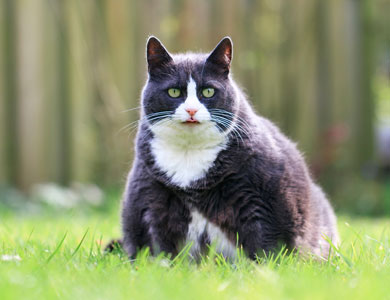
Did you know?
- Sterilized pets expend roughly 20% less energy. Once your pet has been castrated or sterilized, they should be weighed every month in order to ensure stable weight. If their weight increases over time, adjust their food portions accordingly.
- If your pet has to stay indoors, such as during recovery or while at a daycare, their diet should be adjusted accordingly. In order to compensate for the lack of exercise and the decreased portions, it is wise to feed them using toys like the Kong. Doing so will require your pet to work for their meal, which will keep them mentally stimulated.
- Keeping your cat’s weight under control might seem like a tall task, but the same principles apply. Keep them moving by playing with toys every day. You can also teach them tricks and make them work for their food!
- The number of calories expended will vary with the seasons. Huskies, for instance, love to play outdoors during winter, and as such, require more energy during this time of year than during summer. Conversely, smaller animals and those less tolerant of cold weather should eat less during winter than during summer.
If, despite all your efforts, your pet doesn’t appear to be losing any weight, it’s best to speak with a vet. Certain conditions, such as hypothyroid illness, can prevent pets from losing weight due to a slower metabolism. To treat this, medication will be necessary.
Obesity among pets is a serious issue
Obesity is not to be taken lightly. It’s an illness that can lead to major health problems for your pet. The silver lining, however, is that obesity is reversible! So, grab your espadrilles and head outdoors — it’s good for them, and it’s good for you too!

